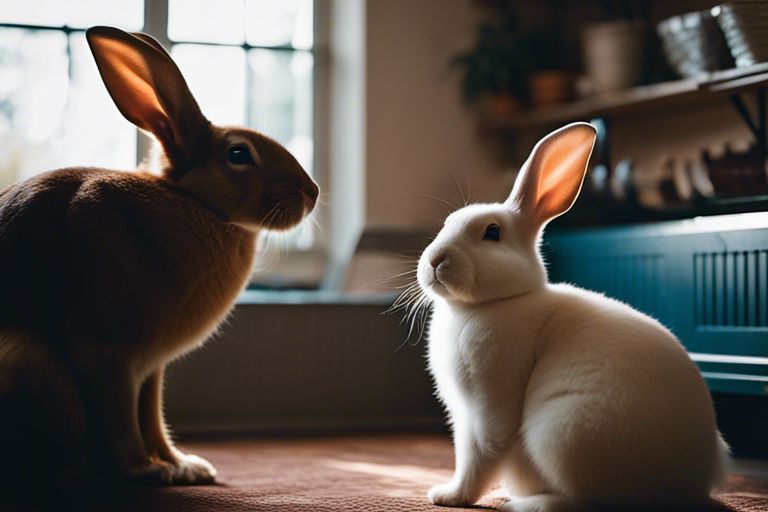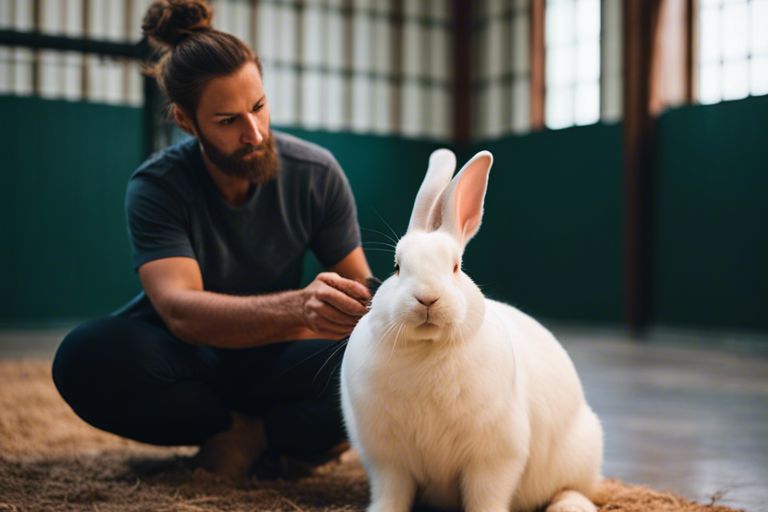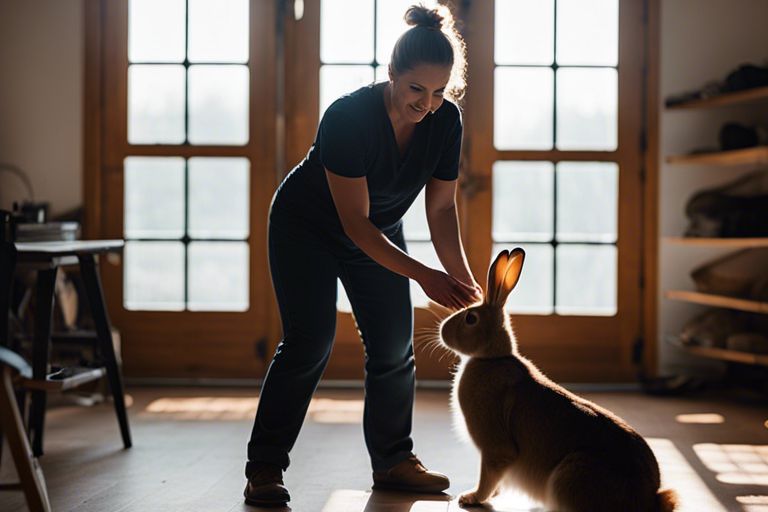Many new owners of Flemish Giants may not realize the importance of desensitization in their training regimen. These gentle giants, known for their calm demeanor and impressive size, can benefit greatly from exposure to various stimuli in a controlled manner. Desensitization involves gradually introducing your Flemish Giant to different sights, sounds, textures, and experiences to help them remain calm and well-adjusted in different situations. Whether it’s loud noises, unfamiliar objects, or interactions with other animals, desensitization plays a crucial role in shaping your Flemish Giant into a confident and well-behaved companion. In this blog post, we will explore the reasons why desensitization is crucial in the training of your Flemish Giant and how you can incorporate it into your daily routine to raise a happy and well-adjusted pet.
Key Takeaways:
- Desensitization is crucial for reducing fear and anxiety: Exposing your Flemish Giant to various stimuli in a controlled manner helps them become more relaxed and less fearful in different situations.
- Gradual exposure is key: Slowly introducing your rabbit to different sounds, objects, and experiences can help prevent overwhelming reactions and build their confidence over time.
- Desensitization aids in shaping positive behavior: By desensitizing your Flemish Giant, you can teach them to respond calmly in potentially stressful situations, ultimately leading to a well-adjusted and well-behaved rabbit.

Basics of Desensitization
What is Desensitization?
Clearly, desensitization is a crucial aspect of training for your Flemish Giant. It involves exposing your rabbit to various stimuli in a controlled and gradual manner to help them become more comfortable and less reactive. Through desensitization, you can help your Flemish Giant build confidence and trust, ultimately leading to a well-adjusted and well-behaved pet.
The Science Behind Habituation
Desensitization works hand in hand with habituation, a psychological phenomenon where an animal becomes accustomed to a stimulus after repeated exposure. By exposing your Flemish Giant to different situations, noises, and sensations in a positive and controlled manner, you can help them learn that these experiences are not threatening. This process helps in reducing fear and anxiety, leading to a calmer and more adaptable rabbit.
Science has shown that habituation is a form of non-associative learning where the Flemish Giant’s response to a particular stimulus decreases over time. This process helps in creating new neural pathways in the brain, leading to a more resilient and confident rabbit. Consistent and patient desensitization training can significantly benefit the overall well-being and behavior of your Flemish Giant in the long run.
Desensitization Techniques
Even the calmest Flemish Giant can benefit from desensitization techniques to ensure they are comfortable and well-behaved in various situations. This training method involves exposing your bunny to different stimuli gradually to prevent fear or anxiety responses.
Gradual Exposure
On the journey of desensitizing your Flemish Giant, gradual exposure is key. Start by introducing one new stimulus at a time, such as different sounds or textures, and observe your bunny’s reaction. If there is any sign of distress, dial back and proceed more slowly until they are at ease with the new experience.
Positive Reinforcement
Gradual desensitization paired with positive reinforcement is a powerful combination in the training of Flemish Giants. By rewarding your bunny with treats, pets, or verbal praise when they exhibit calm behavior during the exposure to stimuli, you are reinforcing the desired response and making the training process more effective.
Reinforcement of positive behavior ensures that your Flemish Giant associates the new stimuli with pleasant experiences, encouraging them to remain calm and confident in various situations. Consistency and patience are key in using positive reinforcement to desensitize your bunny successfully.

Implementing Desensitization
Daily Routines and Desensitization
Implementing desensitization techniques in your Flemish Giant’s daily routines is crucial for their training and overall well-being. By gradually exposing your rabbit to various stimuli such as different sounds, textures, and environments on a daily basis, you can help them become more adaptable and less reactive to unfamiliar situations. This can be done during feeding times, grooming sessions, or playtime, making it a seamless part of their routine.
Desensitization and Socialization
Routines of desensitization are necessary for the socialization process of your Flemish Giant. By introducing your rabbit to different people, animals, and experiences in a controlled and positive manner, you can help them build confidence and trust in their surroundings. This will not only make them more comfortable in new situations but also reduce the likelihood of fear-based behavior such as aggression or withdrawal.
Daily desensitization exercises should be tailored to your Flemish Giant’s individual personality and sensitivities. For example, if your rabbit is particularly sensitive to loud noises, start by playing soft music in the background during their playtime and gradually increase the volume over time. Consistent and patient training will help your rabbit become more resilient and well-adjusted in various environments.
Addressing Common Challenges
Many rabbit owners may encounter challenges when training their Flemish Giant. For a comprehensive guide on Flemish Giant Rabbits, check out Flemish Giant Rabbits – The Ultimate Guide.
Overcoming Fear Responses
Challenges may arise when your Flemish Giant displays fear or anxiety during training sessions. It’s necessary to approach this situation with patience and understanding. Start by creating a safe and calm environment to help your rabbit feel secure. Gradually introduce training activities, using positive reinforcement techniques to build trust and confidence. With time and consistency, your rabbit can overcome fear responses and engage more confidently in training exercises.
Ensuring Consistency in Training
On the path to training your Flemish Giant, consistency is key. Challenges may surface if training sessions are sporadic or inconsistent. Establish a regular training schedule and stick to it. Repetition and consistency help reinforce desired behaviors and strengthen the bond between you and your rabbit. Make sure all family members involved in the training follow the same rules and cues to avoid confusion. By maintaining consistency in training methods, you can effectively teach and communicate with your Flemish Giant.
Addressing common challenges in training your Flemish Giant is crucial for a successful and fulfilling experience. By overcoming fear responses with patience and creating a consistent training routine, you can help your rabbit become a well-trained and happy companion.
To wrap up
Hence, desensitization plays a crucial role in the training of your Flemish Giant rabbit. By gradually exposing your pet to various stimuli and environments, you can help them remain calm and confident in any situation. This process not only ensures a well-behaved and adaptable rabbit but also strengthens the bond between you and your furry companion. So, be patient, consistent, and gentle in your desensitization efforts, and you will see the benefits in your Flemish Giant’s behavior and overall well-being.
FAQ
Q: Why is desensitization crucial in the training of your Flemish Giant?
A: Desensitization is crucial in the training of your Flemish Giant to help them become more adaptable and confident in various situations. It involves gradually exposing your rabbit to different stimuli to reduce their fear or anxiety responses. This process is important for building a strong bond with your pet and ensuring their overall well-being.
Q: How can desensitization benefit the behavior of your Flemish Giant?
A: Desensitization can benefit the behavior of your Flemish Giant by helping them become less reactive and more relaxed in unfamiliar or challenging environments. By exposing your rabbit to different sounds, sights, and experiences in a controlled manner, you can help them learn to remain calm and composed, ultimately leading to a well-behaved and well-adjusted pet.
Q: What are some practical desensitization techniques for training a Flemish Giant?
A: Some practical desensitization techniques for training a Flemish Giant include positive reinforcement, gradual exposure to new stimuli, and patience. You can use treats to reward your rabbit for remaining calm during exposure exercises and slowly introduce them to different scenarios to help them build confidence. Consistency and gentle handling are key to successful desensitization training.
